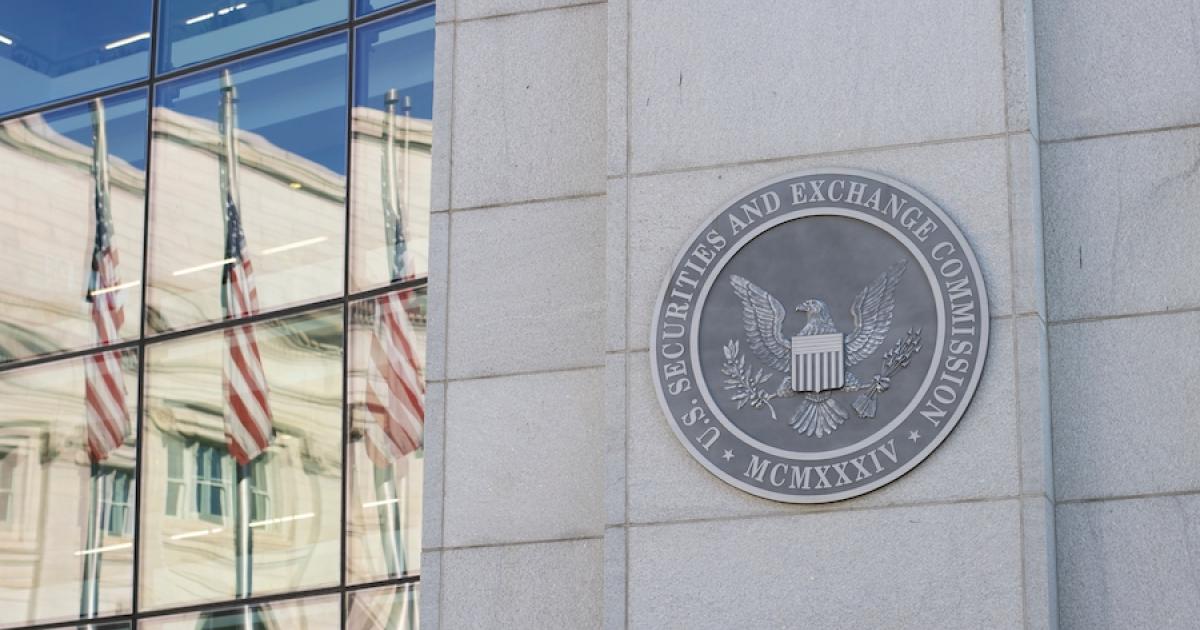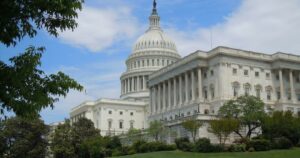
The U.S. House of Representatives committee tasked with oversight of the financial services industry Wednesday held the latest in a series of sessions dedicated to examining the U.S. Securities and Exchange Commission’s role in requiring mandatory ESG disclosure.
The aim of the meeting was for Republicans to continue to rail against a proposed SEC rule that will require companies to disclose environmental, social and governance factors that are material to their operations — providing investors with a way to consider the ESG risk of a company before investing in it.
Spanning more than three hours, much of the hearing hosted by the Financial Services Committee consisted of partisan posturing — with Republican representatives generally arguing against what they perceive as the SEC’s overreach to mandate disclosure about corporate ESG policies and Democratic representatives pushing back, claiming that formalized ESG disclosure provides transparency and supports long-term financial growth. Corporate disclosures in the U.S. are voluntary today, although the European Union has adopted sweeping rules for reporting that will phase in over the next several years and affect certain U.S. companies.
The Financial Services Committee's main function is to provide congressional oversight of the Federal Reserve Board, the Treasury and the nation’s capital markets. The committee is Republican-held and includes 53 members of Congress.
Republicans stressed that mandated ESG disclosures exemplified government corruption in a free market, while Democrats contested that transparency around ESG is the definition of capitalism.
While little was tangibly achieved from the session, a few things stood out.
The witnesses were primarily anti-ESG
Of the five male witnesses called to testify at the hearing, only one, Minnesota Attorney General Keith Ellison, represented a pro-ESG disclosure stance. The rest of the panel consisted of senior fellows from conservative think tanks American Enterprise Institute and Manhattan Institute; a special counsel from global law firm Mayer Brown, which represents clients from the fossil fuel industry; and the vice president of the Society for Corporate Governance, a membership organization of corporate shareholders and special counsel members that has released multiple letters to the SEC to push back against its propose ESG rules.
The concept of materiality was argued
The question of whether environmental disclosures exist as material information for the average investor dominated the day. In his remarks, Rep. French Hill (R-Ark.) introduced the subject, saying, "If ESG factors are material to that investment decision, our law covers that today. No regulatory mandate is necessary."
When then asked whether additional disclosure mandates by the SEC would benefit investors, special counsel at Mayer Brown witness Lawrence Cunningham said, "It’s hard to think why an investor would care to think about trivial [ESG] information or really an avalanche of information that would drown them in useless detail."
What Hill and his Republican colleague failed to address was the nuance attached to ESG related risks — for some industries, insurance as an example, climate change is an existential threat to revenue. That reality has inspired a number of insurers to abandon markets that are particularly prone to climate-fueled flooding or wildfires, including California and Florida.
"Materiality is what a reasonable investor thinks is important," said Rep. Brad Sherman (D-Calif.). "Some people think the environment is important."
Rep. Juan Vargas (D-Calif.) brought the point home when referring to the string of climate-induced forest fires, hurricanes and droughts and their impact on businesses across the country. Vargas argued that companies have a responsibility to discuss how these events affect their operations. “How in the hell can that not be material? That’s what investors want to know.”
Federal overreach vs. capitalism
The main sticking point for the Republican members of the committee consistently returned to what they view as the SEC’s overreach of federal authority.
"It seems like our SEC is more the Securities and Environment Commission than the Securities Exchange Commission,” said Hill in his remarks.
"I’m concerned about the overreach of government regulators … about how they use the discretionary powers that they have to drive down political instruction and decisions," agreed Rep. Pete Sessions (R-Texas). "We believe that the SEC as a government institution is abusing the discretion delegated to it."
Meanwhile, Democratic members of the committee accused their Republican peers of sidelining the principles of capitalism to gut ESG. In her opening remarks, Rep. Maxine Waters (D-Calif.) said, "Republicans will partner with a network of dark-money climate deniers and conspiracy theorists to wage their latest culture war against responsible investing … the Republican effort to dismantle ESG is integral to their agenda to gut diversity and inclusion across the board."
"For over 100 years," agreed Sherman, "the followers of Leon Trotsky and the Socialist Workers Party have waged war against the capitalist model. Today, elements of the Republican Party join them in that effort."
This hearing was the latest in a series that will continue throughout the rest of the summer. The Financial Services Committee’s schedule can be found here.
- SEO Powered Content & PR Distribution. Get Amplified Today.
- PlatoData.Network Vertical Generative Ai. Empower Yourself. Access Here.
- PlatoAiStream. Web3 Intelligence. Knowledge Amplified. Access Here.
- PlatoESG. Automotive / EVs, Carbon, CleanTech, Energy, Environment, Solar, Waste Management. Access Here.
- BlockOffsets. Modernizing Environmental Offset Ownership. Access Here.
- Source: https://www.greenbiz.com/article/missed-congressional-esg-hearing-heres-what-you-need-know
- :has
- :is
- :not
- 100
- a
- About
- accused
- achieved
- across
- Additional
- address
- affect
- against
- agenda
- aim
- Although
- American
- an
- and
- ARE
- argued
- around
- AS
- At
- attorney
- Attorney General
- authority
- Avalanche
- average
- back
- BE
- before
- believe
- benefit
- board
- brad
- Brad Sherman
- brought
- businesses
- by
- california
- called
- CAN
- capital
- Capital Markets
- capitalism
- care
- certain
- change
- claiming
- clients
- Climate
- Climate change
- colleague
- commission
- committee
- Companies
- company
- concept
- concerned
- Congress
- Congressional
- conservative
- Consider
- Conspiracy
- continue
- Corporate
- corporate governance
- Corruption
- counsel
- country
- covers
- Culture
- day
- decision
- decisions
- dedicated
- definition
- democratic
- Democrats
- detail
- Disclose
- disclosure
- Disclosures
- discretion
- discretionary
- discuss
- Diversity
- Diversity and inclusion
- down
- drive
- effort
- elements
- Ellison
- Enterprise
- Environment
- environmental
- ESG
- Ether (ETH)
- European
- european union
- events
- Examining
- example
- exchange
- exist
- existential
- factors
- Failed
- Federal
- federal reserve
- few
- financial
- financial services
- fires
- Firm
- five
- florida
- followers
- For
- forest
- fossil
- Fossil fuel
- found
- Free
- French
- from
- Fuel
- function
- General
- generally
- Global
- governance
- Government
- Growth
- Hard
- Have
- hearing
- Held
- her
- his
- Home
- hosted
- HOURS
- House
- house of representatives
- How
- HTTPS
- if
- Impact
- important
- in
- includes
- Including
- inclusion
- industries
- industry
- information
- inspired
- Institute
- Institution
- insurance
- integral
- introduced
- investing
- investment
- investor
- Investors
- IT
- ITS
- join
- keith
- Know
- latest
- Law
- law firm
- lawrence
- like
- little
- long-term
- Main
- mandate
- mandates
- mandatory
- Market
- Markets
- material
- meeting
- Members
- membership
- minnesota
- missed
- model
- more
- much
- Nations
- necessary
- Need
- network
- next
- no
- Nuance
- number
- of
- on
- ONE
- only
- opening
- Operations
- or
- organization
- our
- out
- over
- overreach
- Oversight
- panel
- particularly
- partner
- party
- People
- phase
- plato
- Plato Data Intelligence
- PlatoData
- Point
- policies
- political
- powers
- president
- primarily
- principles
- propose
- proposed
- provide
- provides
- providing
- providing investors
- Push
- push back
- Pushing
- question
- Rail
- Reality
- really
- reasonable
- Regulators
- regulatory
- related
- released
- Reporting
- Representatives
- represented
- represents
- Republican
- Republicans
- require
- Reserve
- responsibility
- responsible
- Responsible Investing
- REST
- revenue
- Risk
- Role
- rules
- s
- Said
- saying
- schedule
- SEC
- Securities
- seems
- senior
- Series
- Services
- session
- sessions
- several
- Shareholders
- Sherman
- Social
- Society
- some
- special
- sticking
- String
- subject
- summer
- Supports
- Tanks
- than
- that
- The
- their
- Them
- then
- These
- they
- things
- think
- Thinks
- threat
- three
- throughout
- to
- today
- Transparency
- treasury
- u.s.
- U.S. House of Representatives
- U.S. Securities
- union
- use
- vice
- Vice President
- View
- voluntary
- vs
- wage
- want
- war
- was
- Waters
- Way..
- we
- Wednesday
- were
- What
- when
- whether
- which
- while
- why
- will
- with
- witness
- workers
- would
- years
- you
- zephyrnet










